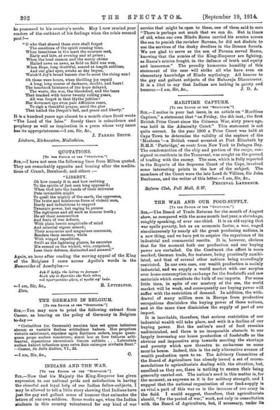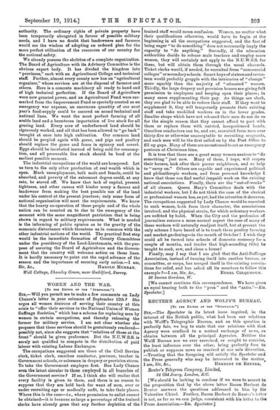THE WAR AND OUR FOOD-SUPPLY. [To ma EDITOR Or THY
" SPECTATOR:1 S/R,—The Board of Trade Returns for the month of August show, as compared with the same month last year, a shrinkage, roughly speaking, of over one-third. It is an old saying that war spells poverty, but as an economic factor, a war, waged simultaneously by nearly all the great producing nations, is a new thing, and we have yet to acquire the experience of its industrial and commercial results. It is, however, obvious that for the moment both our production and our buying power are curtailed. On the Continent the effect is more marked, German trade, for instance, being practically annihi- lated, and that of several other nations being exceedingly restricted. In our own case, our wealth production is mainly industrial, and we supply a world market with our surplus over home consumption in exchange for the foodstuffs and raw materials which constitute the bulk of our imports. For some little time, in spite of our mastery of the sea, the world market will be weak, and consequently our buying power will suffer with the restriction of demand. In addition, the -with- drawal of many million men in Europe from productive occupations diminishes the buying power of those nations, and at the same time diminishes the supply of part of our import.
It is inevitable, therefore, that serious restriction of our industrial wealth will take place, and with it a decline of our buying power. But the nation's need of food remains undiminished, and there is no insuperable obstacle to onr largely increasing our home production of foodstuffs as the obvious and imperative step towards meeting the shortage and poverty which now threaten to embarrass us some months hence. Indeed, this is the only alternative avenue of wealth production open to us. The Advisory Committee of the Board of Agriculture has already issued a set of recom. mendations to agriculturists dealing with the situation, but, excellent as they are, there is nothing to ensure their being generally carried out. The nation's need in this matter is, for the moment, as supreme as it is for military strength, and I suggest that the national organization of our food-supply is as vital a part of this war as is the increase of our army in the field. I would suggest, therefore, that agriculturists should, "for the period of war," work, not only in consultation with the Board of Agriculture, but, if necessary, under its
authority. The ordinary rights of private property have been temporarily abrogated in favour of possible military needs, and I have no doubt that landowners and farmers would see the wisdom of adopting an ordered plan for the more perfect utilization of the resources of our country for the national safety.
We already possess the skeleton of a complete organization. The Board of Agriculture with its Advisory Committee is the obvious expert body. It has divided the kingdom into "provinces," each with an Agricultural College and technical staff. Further, almost every county now has an "agricultural organizer," whose services are at the disposal of farmers and others. Here is a concrete machinery all ready to hand and of high technical perfection. If the Board of Agriculture were now granted power, and an Agricultural Fund were ear- marked from the Improvement Fund or specially created as an emergency war expense, an enormous quantity of our next year's food-supply could be assured on sound technical and national lines. We want the most perfect farming of all arable land and a bounteous importation of live stock for all grazing land. Every acre of underfarmed land should be rigorously worked, and all that has been allowed to "go back" brought at once into high cultivation. Our common land should be peopled again with geese, and pigs and poultry should replace the game and foxes in spinney and covert. Eggs should be incubated instead of being sold for consump- tion, and all procurable live stock should be bred at the earliest possible moment.
The industrial occupations of the world are hampered. Let us turn to the only other production of real wealth which is open. Much unemployment, both male and female, could be absorbed, and poverty of the extremest degree could, at any rate, be staved off. We know that lack of capital, present tightness, and other causes will hinder many a farmer and landowner from making the best possible use of the land under his control at the present juncture; only some form of national organization will meet the requirements. We know that the hearty co-operation of these people and of the whole nation can be counted on to rise to the emergency of the moment with the same magnificent patriotism that is being shown in regard to military requirements. What is needed is the informing of public opinion as to the gravity of the economic disturbance which threatens us in common with the other industrial nations of the world. The practical first step would be the immediate formation of County Committees under the presidency of the Lord-Lieutenants, with the pur- pose of assuring the Board of Agriculture and the Govern- ment that the country will welcome action on these lines. It is hardly necessary to point out the rapid advance of the Beason and the importance of securing early action.—I am,



































 Previous page
Previous page